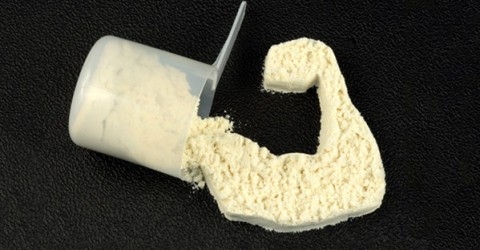|
One of the most popular words I hear around the athletic community is “Supplement”. What do you take for a supplement? What brand of whey protein do you use? Are you cycling through creatine? What about those BCAAs? This is most definitely a loaded subject and one that I could write a dissertation about. Today’s focus will be on educating ourselves on protein and skimming the surface on protein powders. Let’s start by reviewing protein. Protein is one of the three essential macronutrients from which we get energy (aka calories). Protein is made up of building blocks we call amino acids. There are 20 in total, 9 of which are essential meaning we have to get them from external sources (food). Some of protein’s functions include enzyme and hormone production as well as building and repairing muscle, skin, nail and hair. How much protein do I need daily? The RDA (Recommended Dietary Allowances) for protein is 0.8 g/kg of body weight per day for the average adult. There has however been some debate about whether this amount is enough to promote optimal health. Protein is important especially in those looking to increase their physical activity for fitness or sport. Not enough protein and the body will break down protein in the muscle and use it for energy. It’s no surprise that more active individuals would require more protein compared to those who call walking to the bus stop their daily sweat. Protein requirements will vary greatly depending on many things; what type of athlete you are, your weight, age, exercise intensity, duration, physical preference, and diet quality. Endurance athletes require 1.2-1.4 g/kg of body weight per day where as strength and power athletes require 1.2-1.7g/kg. Some suggestions recommend 1.1 to 1.4 g for recreational athletes. (Fink, 2009)  Is protein supplementation necessary? The International Society of Sports Nutrition suggests high-quality protein from food is enough to repair muscle tissue and improve performance (Campbell, 2007). High quality proteins come from milk, egg, soy, meat and fish. These sources contain all the essential amino acids. Leucine, an essential amino acid, may actually play a very important role in initiating muscle protein synthesis. Leucine-rich proteins include dairy products, beef, poultry, seafood, pork, peanuts, beans, lentils, and soybeans. Some evidence also suggests that 10-20 grams of high quality protein in the early recovery period is enough to maximally stimulate protein synthesis (PEN, 2014). Whey and soy protein for example are high quality proteins. Rice and pea protein however are not complete proteins. Protein supplements are no more or no less effective than food for building muscle mass when dietary energy intake is adequate (PEN, 2014). Even though that may be the case, I don’t ever rule out protein powder. Of course as a Dietitian I am a big supporter of food through nutrition, but powders can be of benefit for some. For starters it’s extremely convenient. Here’s a scenario; you finish your workout, socialize with your pals for 10 minutes, commute home, answer some emails, make your meal, and finally start eating 2 hours post exercise. You have already missed the most critical time for refueling. Taking protein powder and having this on your way home with carbohydrates would be of benefit to your recovery. I might also recommend a supplement for those who don’t have much of an appetite following a workout. By simply not eating any protein you risk protein catabolism; where your body may utilize muscle protein as an energy source when its glycogen stores are depleted. Powders are also an easier and faster way of consuming protein. Making a smoothie with some yogurt and fruit, or munching on a homemade protein bar with dried fruit and whole grains is clearly a much better alternative to not eating, which many of us are guilty of doing when the thought of making a meal is exhausting in itself. Some of the reasons why I might not support them? As an isolated macronutrient, protein powders lack other nutrients that naturally accompany proteins found in food. Beef has iron. Salmon contains healthy fats. Yogurt has calcium. Protein supplements do not contain these nutrients. When we eat food sources of protein, we often eat them in conjunction with other whole foods that offer vitamins, minerals, carbohydrates, and heart-healthy fats that are not found in protein supplements. At the end of the day, taking a protein supplement comes down to lifestyle habits and really what’s most convenient for you. Is it a good source of protein for recovery? Sure. Should you substitute it for a meal? No. If protein powder is what works for you, try to accompany it with food sources that are rich in carbohydrates, electrolytes and fluid for recovery. Now at this point you might be asking yourself “but what kind of supplements would you suggest”? A topic for another time readers… Emilie Trottier, RD, Sports Dietitian [email protected] References Fink HH, Burgoon LA, Mikesky AE. Endurance and Ultra-Endurance Athletes: Practical Applications in Sports Nutrition. Sudbury, MA: Jones and Bartlett; 2009 Campbell B, Kreider RB, Ziegenfuss T, et al. International Society of Sports Nutrition position stand: protein and exercise. J Int Soc Sports Nutr. 2007;4:8 PEN. Sport Nutrition Evidence Summary. The Global Resource for Nutrition Practice. 2014
19 Comments
19/7/2020 10:19:40 pm
Food supplements are concentrated wellsprings of supplements taken as a dietary top-up.Thank you.
Reply
28/7/2020 11:18:26 pm
Great content!! So much informative content you produce high quality of content which is good for those people can possible visit you site. It same like Haarlem Oil or Black Cumin Seed Oil made by french people in France. I love the journey of my research from this website. Hope you do more blog post here about health. Thank you and God bless!!!
Reply
9/9/2020 04:28:08 pm
Thanks for the tip to take a supplement after working out if you don't have an appetite. I think a ton of people ignore this at first and try to force themselves to eat or they just don't do anything. You don't want that time after working out to go to waste so it is best to take the supplement then.
Reply
23/11/2020 02:55:21 pm
Thank you very much for sharing this great information about supplements. I was just looking out for differences between <a href="https://bcaadrinks.com/bcaa-vs-whey-protein/">bcaa vs whey protein</a>. Can you please tell me like what is the actual difference between these bcaa and whey protein supplements.
Reply
25/11/2020 04:45:15 am
Best Protein For Lean Body Goals <a href="https://www.supplementsvilla.com/Mutant-Iso-Surge-Isolate-Protein?search=iso%20surge">Click Here</a>
Reply
3/4/2021 12:04:28 am
I like that this post shared that one of the benefits of choosing of protein drinks is that it can boost of metabolism. I do believe it would benefit our gym habit tremendously. I will definitely keep this information in mind for future references.
Reply
15/4/2021 05:27:55 am
You are absolutely correct and thanks for giving information about the protein supplement. I loved your blog and thanks for publishing this!! I am really happy to come across this exceptionally well written content. Thanks for sharing and look for more in future!!
Reply
21/7/2021 02:04:58 am
Thank you for sharing it helps me a lot. Now, I have experience on Genuine Haarlem Oil who helps to recover the pains of my mother. Very effective food supplements it can help also to boost your immune system. btw. I love your article you shared on us.
Reply
16/1/2022 12:12:03 pm
Very much appreciated. Thank you for this excellent article. Keep posting!
Reply
Leave a Reply. |
Categories
All
Archives
November 2021
|
- Home/ News
- About
- Services/ Store
- Media
-
Learning Center
- ESN Athletic and Healthy Lifestyle Learning Center >
-
Professional Learning Center
>
-
The ESN Sports Nutrition Certificate
>
- ESN Learning Center - Sports Nutrition Certificate Level 1 >
- ESN Learning Center Sports Nutrition Certificate Level 2 >
-
ESN Learning Center - Sports Nutrition Certificate Level 3
>
- Module 1 - Periodization for the Athlete
- Module 2 - Nutrition Strategies to Optimize Recovery
- Module 3 - Sports Nutrition for Children and Young Athletes
- Module 4 - Sports Nutrition for the Aging Athlete
- Module 5 - Nutritional Strategies for Injury Prevention and Concussions
- Module 6 - Nutritional Strategies for the Travelling Athlete
- Module 7 - Tournament Nutrition Strategies
-
The ESN Sports Nutrition Certificate
>
- Contact
Proudly powered by Weebly



 RSS Feed
RSS Feed